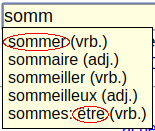With the search functions you can find all conjugated or declined forms of French verbs and adjectives from the Cactus2000 word tables and assign them correctly.
You do not need to type special characters in all search functions. E.g. instead of "é", "è" or "ê" you can type "e". This makes a search easier, in particular when you do not know the correct accent.
The search field for conjugated and declined forms you find at the top of every page with lists of French verbs and adjectives. It allows to find all forms that are contained in the tables. The search for adjectives is also possible from the verb pages and vice versa.
As example we search the form sommes.
| nous sommes | 1. person plural, indicative present | être |
| tu sommes | 2. person singular, indicative present | sommer |
| tu sommes | 2. person singular, subjunctive present | sommer |
| sommés | participe perfekt plural masculin | sommer |
The word is typed into the search field letter by letter. French words that agree with the present string appear in the popdown. After the input of 4 letters (somm) the verbs you search appear for the first time.

After the input of 5 letters (somme) in the upper line of the popdown "somme: sommer (vrb.)" appears, showing that the 5 letters represent a complete form of the verb sommer (je somme or it somme).

When also the 6. letter of the word to search is typed, the following two lines appear

showing again that complete forms of the two verbs are represented. A click on one of the lines in the pulldown leads to the conjugation page of the corresponding verb and the serached forms are printed in bold to make finding them easier. If the searched form exists from several verbs, you find a link to the other possibilities at the top of the verb table.
In the pulldown of the search all possible results (8 maximum) are shown. When you know that, for example, you search a verb, the result might be more clear, when only verbs would be shown. With the checkbox "verbs only" you can switch this option on. In following searches from a page with verb tables only the forms of verbs are searched. Another click on the checkbox switches the option off.
A corresponding option exists also on the pages for French adjectives.
On the page Search functions there are special search fields for French verbs and adjectives. These do not search conjugated or declined forms of the words but the basic forms. When you type a sequence of letters into the search field, those words appear in the pulldown that start with this sequence. However, when you click the button "verb" after the input of 3 letters minimum, a list appears with all words that contain this sequence even when the sequence is not in the beginning.
Verbs often consist of a prefix and a stem. When you type a stem into the search field, the list contains all verbs with the stem and all possible prefixes. Example: You type "prendre" into the search field and click the "verb" button. You get a list containing 11 verbs with the stem prendre and different prefixes.
In the same way you can search adjectives, e.g. with the same ending.
On the page Search functions there is a special search field Determination of conjugated forms. The conjugated expression that has to be determined has t o be typed completely. Only the input of personal pronouns (or reflexive pronouns) is optional. When the conjugated expression consists of several words their order in the input is free.
When you type sommes into the search field (as in the example above), after a click on the "form" button a page appears with a table containing all 4 possible forms. ((nous sommes: 1. person plural, indicative present of être. tu sommes: 2. person singular, indikativ present and 2. person subjunctive present of sommer and sommés: participe perfect plural masculin of sommer.) Links lead to the conjugation tables.
The input of the personal pronoun can reduce die number of results. When you type the personal pronoun in addition (nous sommes, the result list contains the form of the verb être only.
When you type a participe perfect only, e.g. ri, the form search shows, that it is a PP. When you type in addition a correct auxiliary, e.g. avions ri, the form of the composed time is the result (nous avions ri : 1. person plural, indicative past perfect active). A search string consisting of participe perfect and personal pronoun without auxiliary is not possible.
Passive forms can also be determined. Here it has to be paid attention that in passive
the participe perfect has to be in agreement. As example, the input of avait ete prise
gives two possible answers:
indicative past perfect passive, 3. person singular feminin of prendre: elle avait été prise and
indicative past perfect passive, 3. person singular masculin of priser il avait été prisé.